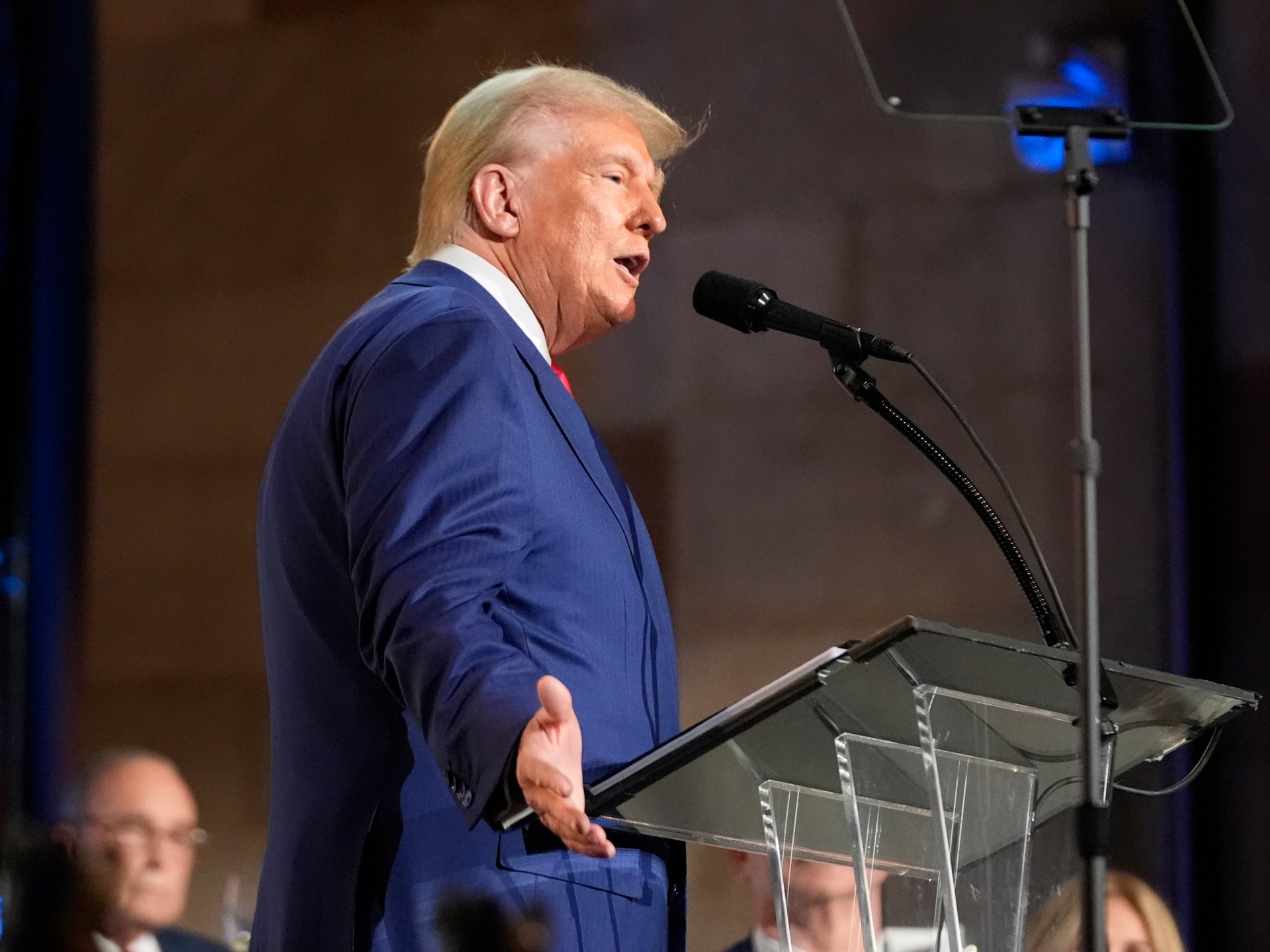
Former United States President Donald Trump has pledged to create a “government efficiency” commission headed by entrepreneur Elon Musk if he is victorious in seeking re-election this November.
Trump made the pledge as he laid out his economic vision in a campaign speech at the New York Economic Club on Thursday.
Promises of economic prosperity have been a backbone of Trump’s re-election bid in 2024, and he used Thursday’s speech to showcase his plans for a “national economic renaissance”.
They include oft-repeated proposals to slash regulations on energy production, cut government spending and lower corporate taxes for US companies.
Less familiar were his plans to embrace cryptocurrency and create the Musk-led commission, which he said would eliminate “fraud and improper payments” within six months of being formed.
“I will create a government efficiency commission tasked with conducting a complete financial and performance audit of the entire federal government and making recommendations for drastic reforms,” Trump said.
The US government already has the nonpartisan Government Accountability Office (GAO), a federal watchdog agency tasked with investigating federal spending and performance. Trump did not offer details about the proposed new commission or how it would operate.
Still, the pledge was swiftly condemned by the president of the American Federation of Government Employees, a union that represents about 750,000 federal workers.
In a statement to the Reuters news agency, Everett Kelley accused Trump and Musk of wanting to gut the nonpartisan civil service sector and replace fired workers with political allies.
“There’s nothing efficient about that,” Kelley said.
For his part, Musk wrote on X that he would accept the post if Trump were to win the November 5 election. He had previously said during a podcast in August that he had discussed the commission with Trump.
“I look forward to serving America if the opportunity arises,” said Musk, who purchased the social media company X, then known as Twitter, in 2022. “No pay, no title, no recognition is needed.”
He quickly lifted Trump’s ban from the platform after acquiring it. He later endorsed Trump for president following an assassination attempt against the Republican leader in July.
Economy and the ballot box
The economy has emerged as a key issue in the 2024 presidential election, in which Trump is facing off against Vice President Kamala Harris, the Democratic candidate. That comes as US consumers continue to struggle with the cost of living, despite inflation slowing over the past two years.
Last month, Harris unveiled a populist-leaning economic vision that would ban “price gouging” on groceries. It also would boost first-time homebuyers, offer a child tax credit and create tax incentives for affordable home builders.
On Wednesday, she also said she would seek an increase to the capital gains tax for wealthy Americans — but that it would be lower than a similar increase proposed by President Joe Biden.
Harris plans to implement a 28 percent tax on investment profits for those in the highest income bracket, less than the 39.6 percent proposed by Biden. The move has been seen as an effort to broaden Harris’s appeal among the ultra-wealthy.
Speaking before several prominent CEOs on Thursday, Trump reiterated his plan to cut the US corporate tax rate to 15 percent from 21 percent, but only for companies that manufacture domestically.
He also said he would open up tracts of federal land to homebuilding in a bid to drive down housing costs. These new housing zones would be “low tax” and “low regulation”, Trump said, without elaborating.
Polls have indicated that voters generally view Trump as better suited to handling the economy than Harris, although the pair remain neck and neck in national polls, as well as surveys of battleground states.
EMEA Tribune is not involved in this news article, it is taken from our partners and or from the News Agencies. Copyright and Credit go to the News Agencies, email news@emeatribune.com Follow our WhatsApp verified Channel





